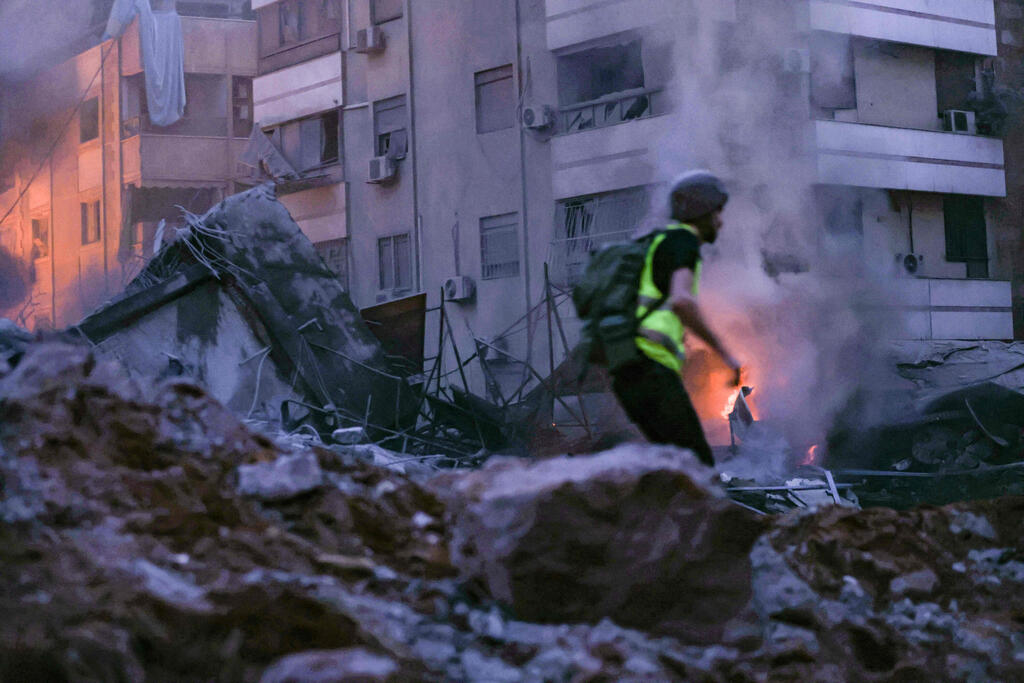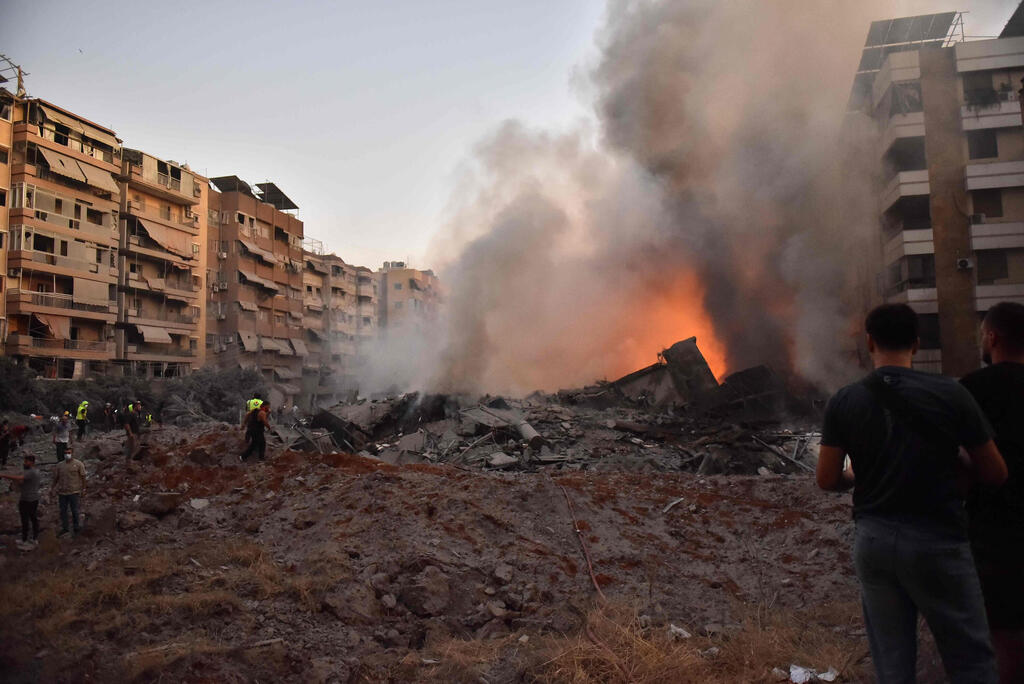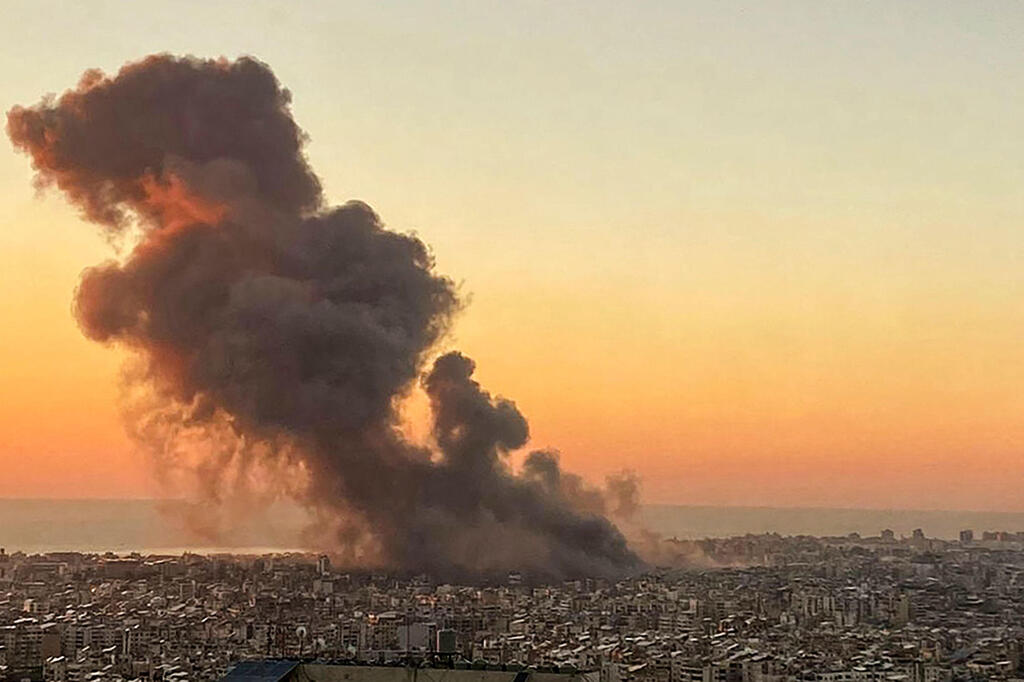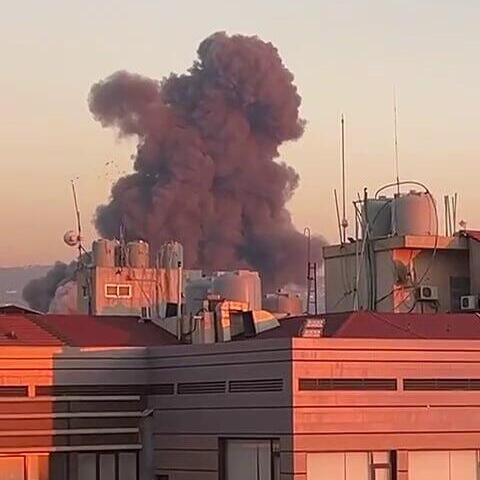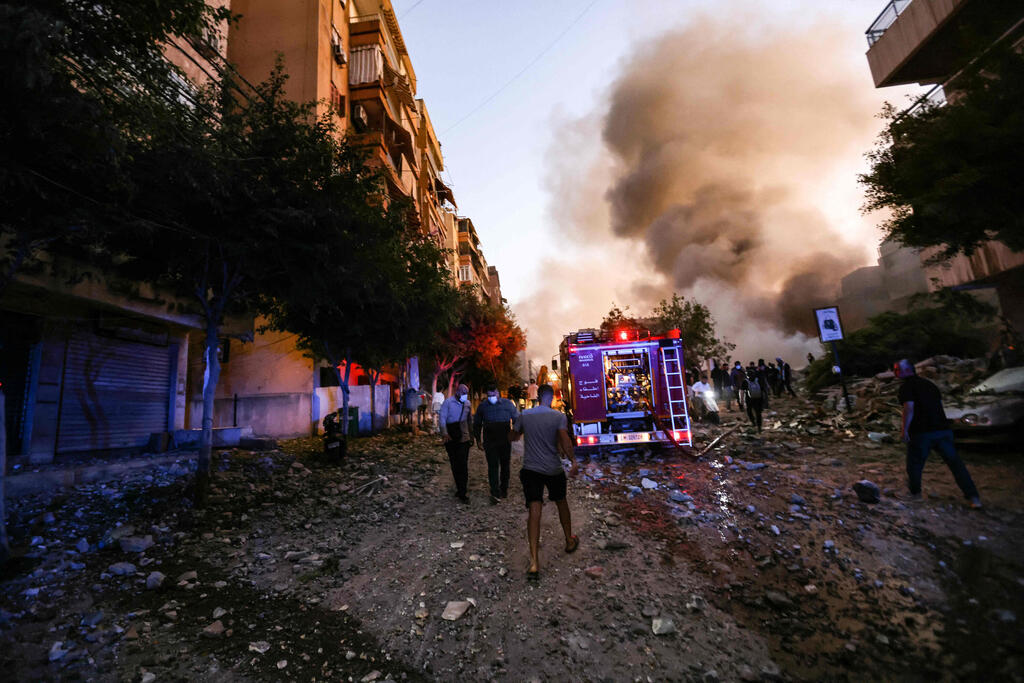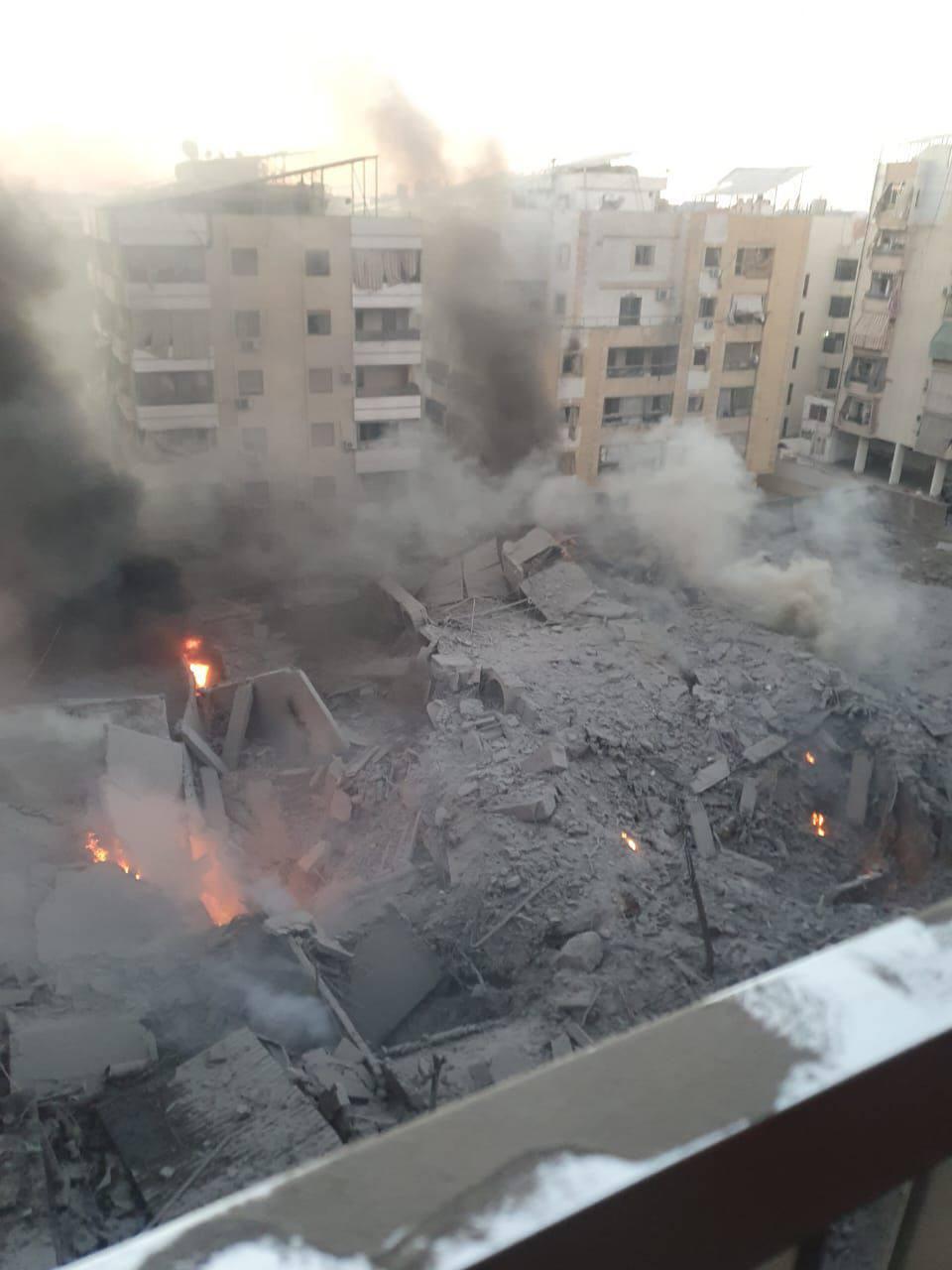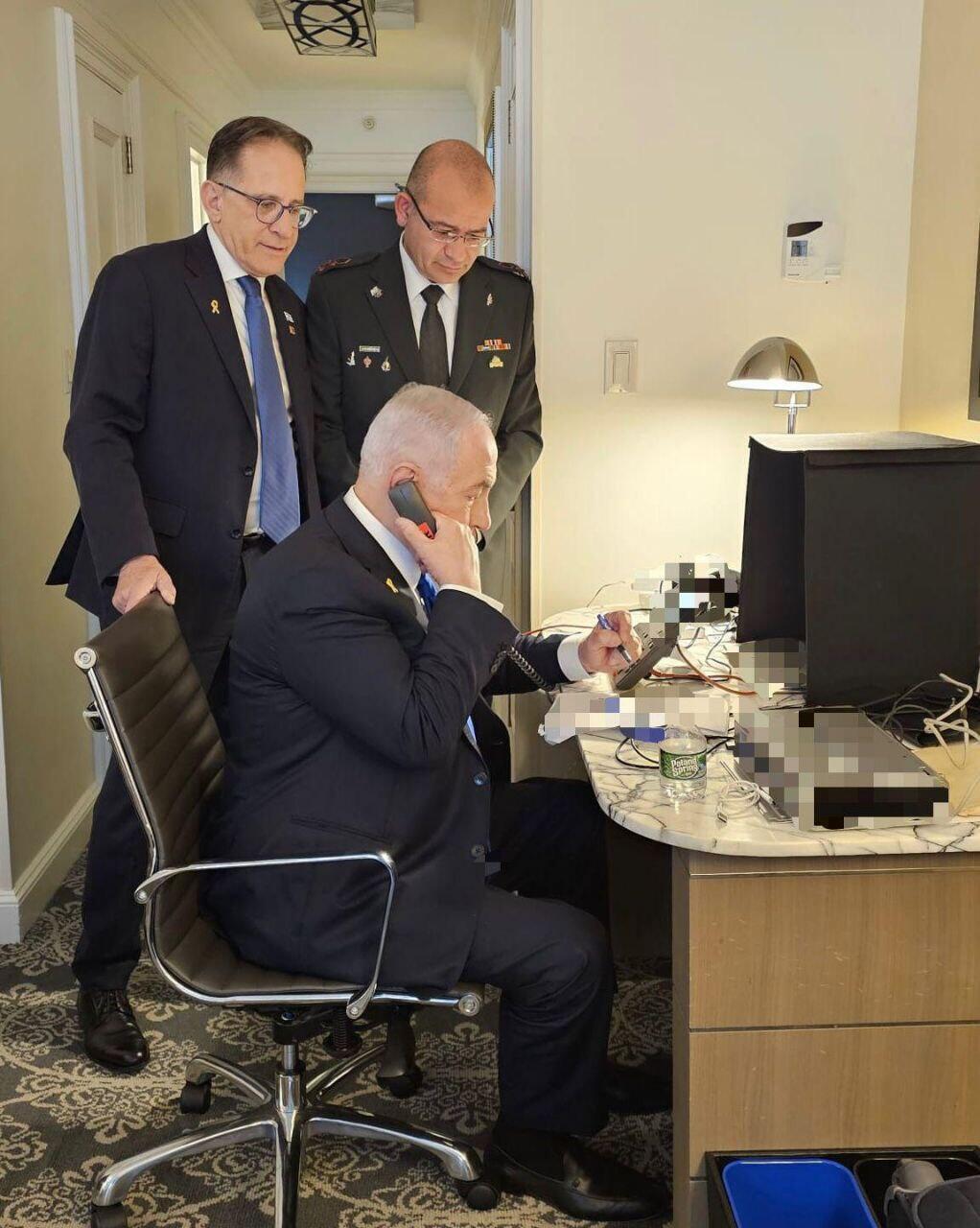Getting your Trinity Audio player ready...
Aftermath of Israeli airstrike on Hezbollah HQ in Beirut's Dahieh district
The IDF said it carried out an airstrike on Friday evening targeting Hezbollah’s central command, located beneath residential buildings in the Dahieh district in southern Beirut.
Some media reports suggested that the Lebanese terrorist group's leader, Hassan Nasrallah, was the intended target. A source close to the group told Reuters that Nasrallah is alive. Hezbollah sources also told Iran's Tasnim and Sky News Arabia that Nasrallah was taken to a secure location.
“On October 8, Hezbollah, led by Nasrallah, initiated a war and has since escalated the situation," IDF spokesperson Rear Admiral Daniel Hagari said in a televised statement. "Israel warned them, but they continued their aggression against our citizens and sovereignty. The Air Force continues to strike terror targets to diminish their capabilities.”
Hagari added there are no changes to the Home Front Command’s safety guidelines and any updates will be provided immediately through official channels.
Security sources in Lebanon told Reuters the attack, the most extensive Israeli assault on the southern Beirut Hezbollah stronghold since the war began, targeted an area where top Hezbollah officials are usually based.
In past conflicts, senior Iranian officials have often been present alongside Hezbollah leaders during military campaigns. During the 2006 Lebanon War, Qassem Soleimani, the commander of Iran’s Quds Force, accompanied Nasrallah and the group's then-military chief Imad Mughniyeh. Israel is now investigating whether any Iranian officials were among those hit in the strike.
Hezbollah-affiliated Lebanese network Al Manar reported that at least six buildings were destroyed in the attack. Local reports indicated that around 10 explosions were heard in the Lebanese capital.
The Lebanese National News Agency described the strikes as creating a “belt of fire” from Lebanon's Palestinian Burj Barajneh refugee camp to Haret Hreik. Saudi television channel Al Arabiya reported that dozens were injured in the airstrike.
The Lebanese Health Ministry reported that at least two people were killed and 76 others injured in the powerful Israeli airstrike.
A senior U.S. intelligence official told Sky News Arabia that Nasrallah “could not have survived” the strike if he had been in the building or beneath it.
Lebanese Prime Minister Najib Mikati condemned the attack, saying, “The strike in Dahieh shows that Israel disregards international calls for a cease-fire.”
A security source told Reuters the Lebanese army was protectively setting up a security cordon around the U.S. embassy in Lebanon, which is north of Beirut.
Iran's embassy in Lebanon said on X that the strike represents a dangerous game-changing escalation that will "bring its perpetrator an appropriate punishment."
Pentagon spokesperson Sabrina Singh told reporters the United States had no advance warning of the strike in Beirut and U.S. Defense Secretary Lloyd Austin spoke with his Israeli counterpart as the operation was ongoing.
"The United States was not involved in this operation and we had no advanced warning," she said, declining to say what Defense Minister Yoav Gallant told Austin about the operation and whether it targeted Nasrallah. The Pentagon also declined to speculate on whether the Hezbollah leader was still alive.
Austin and Gallant spoke as the Pentagon chief flew over the Atlantic after a visit to London.
The strikes hit Beirut shortly after Prime Minister Benjamin Netanyahu vowed to continue Israel's attacks on the Iranian-backed terrorist group in Lebanon in a closely watched United Nations speech, as hopes faded for a cease-fire that could head off an all-out regional war.
Netanyahu abruptly left a press briefing he was holding following his speech after learning about the strike. He decided to cut short his U.S. trip and will depart for Israel from New York at 3 a.m. local time.
Gallant, IDF Chief of Staff Lt. Gen. Herzi Halevi and Air Force Commander Maj. Gen. Tomer Bar visited the Air Force command center in Tel Aviv earlier on Friday.
8 View gallery


Defense Minister Yoav Gallant, IDF Chief of Staff Lt. Gen. Herzi Halevi and Air Force Commander Maj. Gen. Tomer Bar at the Air Force command center in Tel Aviv
(Photo: Defense Ministry)
On Thursday, the IDF killed Hezbollah’s air unit commander Mohammed Srur in Beirut, using three missiles near the site where Ibrahim Aqil, Hezbollah’s head of operations, and other senior Radwan Force commanders were killed last weekend.
On Tuesday, the IDF targeted Ibrahim Qubaisi, Hezbollah’s head of missile operations, in a strike on Dahieh. According to the army, several key commanders in Hezbollah’s missile and rocket divisions were with Qubaisi at the time of the strike.
Earlier this week, the IDF attempted to eliminate Ali Karaki, Hezbollah’s southern front commander and the organization’s third-highest-ranking official. However, Hezbollah announced that Karaki survived and had been moved to a secure location.
In July, Fuad Shukr, described as Hezbollah’s “most senior military commander and head of the group’s strategic operations,” was killed in Dahieh. According to the IDF, Shukr was a close aide and strategic adviser to Nasrallah.






